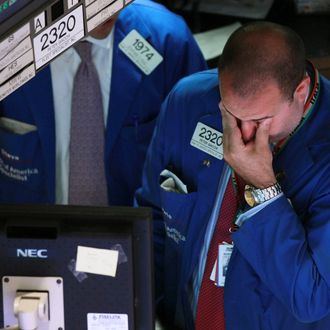
Yesterday, Fed chairman Ben Bernanke took to his podium and tried to reassure Wall Street that everything would be okay, even if the Fed decided to scale back the boost it had been giving the markets in the form of an $85 billion-a-month bond-buying stimulus plan. Today, Wall Street freaked out anyway. The S&P 500 closed down 2.5 percent, and the Nasdaq and the Dow both lost 2.3 percent — the biggest one-day drop in the Dow since November 2011. And the yields for ten-year U.S. Treasury bonds spiked to a 22-month high.
Why? Well, there’s a simple explanation and a few tougher ones.
The simple explanation is that the market is worried about the end of Fed stimulus, which Bernanke signaled yesterday could begin by the end of the year. Some investors hated these bond-buying programs when they were announced, since they distorted the bond markets and threw off traders’ price signals. But in the intervening years, the market has gotten used to them. Now investors are scared of losing them too quickly.
The tougher explanation is that today’s stock declines came out of a hovering cloud of bad sentiment caused by several negative economic data points that arrived over the last few weeks. Today, those data points included some bad Chinese manufacturing data and some worrying news about the IMF threatening to suspend Greek aid. And added to fear over the Fed’s stimulus, those data points might have tipped the market into panic mode.
There’s probably some validity to the sentiment-cloud theory, but in truth, Bernanke is probably mostly to blame for the sell-off. The market has been on tenterhooks about when and how (mostly when) the Fed will begin to tighten its monetary policy. And the same people who screamed when the bond-buying began, saying that the Fed should let the economy try to stand on its own two feet, are now fretting the eventual loss of their crutches.
There’s probably nothing Bernanke could have said yesterday, short of “we are committed to continuing our quantitative easing program at current levels for the next five years, no matter what,” that would have made today a normal one in the stock markets. The end of QE was inevitable, but that doesn’t change the fact that it’s hard news to deliver smoothly. Judging from the market’s reaction today, Bernanke might want to work on his delivery.





























